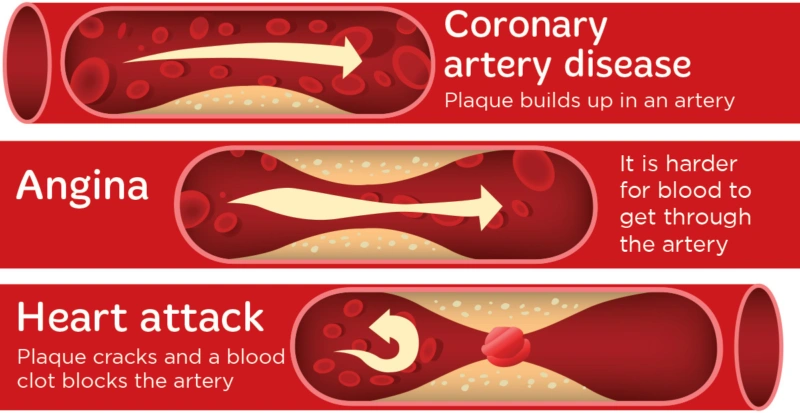
How do you know if you’re having a heart attack? How do you tell if it’s heartburn or a heart attack? When should you worry?
Heart attacks are one of NZ’s biggest killers. Cardiovascular disease causes 1 in 3 deaths in NZ, including heart attack, stroke or blood vessel disease. Because so many people are affected, we hear a lot about these statistics. But that doesn’t mean we understand what causes a heart attack and how to tell if we’re having one.
What is a heart attack?
A heart attack is when blood stops flowing to a part of your heart. If blood flow can’t be restored quickly to the heart, the piece of the heart muscle becomes damaged from lack of oxygen and starts to die. The damage can be permanent. This image from the NZ heart foundation shows what happens inside your arteries.
Heart attack versus heartburn?
Heartburn, angina and a heart attack can all feel similar. Sometimes even doctors can’t tell the difference from your medical history or a physical exam. That’s why if you’re having chest pain, you’re doctor is likely to ask you to head to the hospital for several tests to rule out a heart attack.
Heartburn usually includes a burning feeling that starts in the upper part of the stomach and radiates to the chest. It can cause a painful burning just behind the breastbone.
- Burning chest pain that begins at the breastbone
- Pain that moves up toward your throat but doesn’t spread to your shoulders, neck or arms
- Feels like food is coming back into your mouth
- Bitter or acid taste in your mouth
- Pain that worsens when you lie down or bend over
- Symptoms come on after a large or spicy meal
People often describe a heart attack as a feeling of tightness, constriction, or pressure rather than burning.
- Heaviness, tightness, pressure, squeezing, stabbing, or a dull pain generally in the centre of the chest
- Pain that spreads to the shoulders, neck, or arms
- Irregular or rapid heartbeat
- Cold sweat or clammy skin
- Fatigue, lightheadedness, weakness, or dizziness
- Shortness of breath
- Nausea, indigestion and sometimes vomiting
- Symptoms come on after physical exertion or extreme stress
Women are less likely to have crushing chest pain, which makes heart attacks in women harder to identify. This is because they are more likely to have blockages in the tiny coronary artery blood vessels that branch off from the main arteries and blockages in the main arteries themselves. Not having the more well-known symptoms means women are more likely to be misdiagnosed. If you’re female and having any of the symptoms listed above, get yourself checked.
What can I do to decrease my risk?
You can do a lot to manage your own health and reduce your risk of several major diseases.
Managing your weight is a start. A useful measure is your BMI (body mass index) or your waist measurement, but they should both be used in conjunction with other measures. Keeping active, quitting smoking, eating healthily, and managing any other underlying conditions such as diabetes, highcholesterol, or high blood pressure all play a part.
If you’re interested, look at the ‘heartcheck’ at the heart foundation and get an idea of your heart health.
Heart attacks and life insurance
Our Critical Illness cover includes heart attacks. That means if you have a heart attack and live, you will receive a payment that you can use however you need. The payment will be the amount you chose when you took out your policy, up to $625,000. Critical Illness can only be purchased with Life Insurance, not as a stand-alone product. It’s also an ‘early payment benefit’, so your Life Insurance amount will reduce by the amount paid out for your Critical Illness.
Of course, if you die from a Heart Attack, we will pay your Life Insurance in full.
This blog only provides you with general information and doesn’t consider your personal situation or objectives. If you’d like advice about your personal situation, contact our customer service team at ask@pinnaclelife.co.nz or on 0800 22 22 23, or try our advice tool for a personal recommendation.
Sources:
https://www.heartfoundation.org.nz/statistics
https://www.heartfoundation.org.nz/your-heart/heart-conditions/about-heart-attacks






